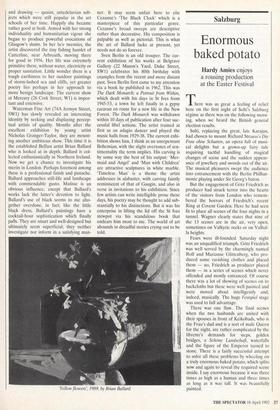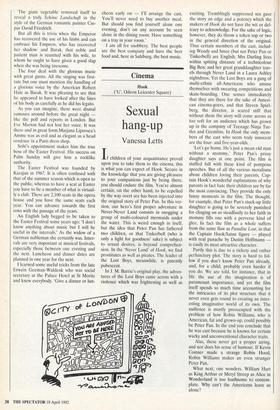Salzburg
Enormous baked potato
Hardy Amies enjoys a rousing production at the Easter Festival There was as great a feeling of relief here on the first night of Solti's Salzburg regime as there was on the following morn- ing, when we heard the British general election results.
Solti, replacing the great, late Karajan, had chosen to mount Richard Strauss's Die Frau ohne Schatten, an opera full of musi- cal delights but a grown-up fairy tale requiring tactful handling of magical changes of scene and the sudden appear- ance of jewellery and swords out of the air. The musical pleasures swept the audience into entrancement with the Berlin Philhar- monic playing under Sir Georg's baton.
But the engagement of G6tz Friedrich as producer had struck terror into the hearts of the visitors from London who remem- bered the horrors of Friedrich's recent Ring at Covent Garden. Here he had seen fit to place all scenes of the four nights in a tunnel. Wagner clearly states that nine of the 13 scenes are in the air, very open, sometimes on Valkyrie rocks or on Valhal- la heights.
Fears were ill-founded. Saturday night was an unqualified triumph. Gotz Friedrich was well served by the charmingly named Rolf and Marianne Glittenberg, who pro- duced some ravishing clothes and placed
them — no, Friedrich as producer placed them — in a series of scenes which never offended and mostly entranced. Of course there was a lot of showing of scenes on to backcloths but these were well painted and were moved about intelligently and, indeed, musically. The huge Festspiel stage was used to full advantage.
There was one flaw. The final scenes when the two husbands are united with their spouses in front of Keikobads, who is the Frau's dad and is a sort of male Queen for the night, are rather complicated by the libretto's demands for steps, golden
bridges, a Schone Landschaft, waterfalls and the figure of the Emperor turned to
stone. There is a fairly successful attempt to solve all these problems by wheeling on a truly enormous baked potato, which splits now and again to reveal the required scene
inside. I say enormous because it was three times as high as a human and three times as long as it was tall. It was beautifully painted.
The giant vegetable removed itself to reveal a truly &hone Landschaft in the style of the German romantic painter Cas- par David Friedrich.
But all this is trivia when the Emperor has recovered the use of his limbs and can embrace his Empress, who has recovered her shadow: and Barak, that noble and patient man is reunited with his wife, to whom he ought to have given a good slap when she was being tiresome.
The four deal with the glorious music with great gusto. All the singing was first- rate but one must mention the handling of a glorious voice by the American Robert Hale as Barak. It was pleasing to see that he appeared to have looked after the lines of his body as carefully as he did his legato.
As you can imagine, there were dismal rumours around before the great night - like the poll and reports in London. But Eve Marton had not lost her voice. It was there and in great form.Marjana Lipovsea's Amme was as evil and as elegant as a head vendeuse in a Paris dress shop.
Solti's appointment makes him the true boss of the Easter Festival. His success on Palm Sunday will give him a rocklike authority.
The Easter Festival was founded by Karajan in 1967. It is often confused with that of the summer season which is open to the public, whereas to have a seat at Easter you have to be a member of what is virtual- ly a club. There are 2,100 seats in the opera house and you have the same seats each year. You can advance towards the first rows with the passage of the years.
An English lady begged to be taken to the Easter Festival some years ago: 'I don't know anything about music but I will be useful in the intervals.' As the widow of a German nobleman she certainly was. Inter- vals are very important at musical festivals, especially those between one evening and the next. Luncheon and dinner dates are planned in one year for the next.
I learned some useful tricks from the late Erwein Geeman-Waldenk who was social secretary at the Palace Hotel at St Moritz and knew everybody. 'Give a dinner or lun- cheon early on — I'll arrange the cast. You'll never need to buy another meal. But should you find yourself alone one evening, don't on any account be seen alone in the dining room. Have something on a tray in your room.'
I am all for snobbery. The best people are the best company and have the best food and, here in Salzburg, the best music.



















































 Previous page
Previous page